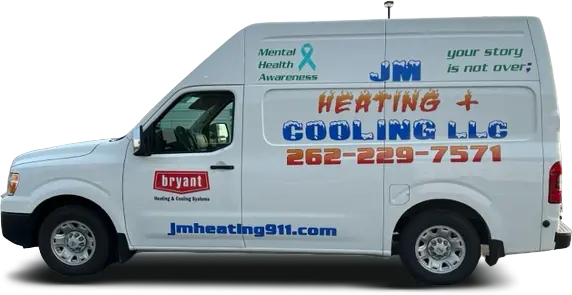Indoor Air Quality FAQs, Tips, and Advice
As homeowners, we spend 90 percent of our time indoors—so it makes sense to have some questions about the quality of the air circulating throughout our homes. JM Heating and Cooling is here to help with answers to your top indoor air quality FAQs. Find them below, and if you want to learn more or would like an in-home consultation, contact us today.

-
The EPA suggests indoor air is two to five times more polluted than outdoor air—and sometimes well above that mark. Common sources of indoor pollution include excess moisture, asbestos, household cleaners, fuel-burning appliances, fireplaces, cooking, smoking, and pets. Several products like air purifiers or ventilation systems as well as UV lights can combat these indoor air pollutants.
-
Yes, humidity impacts your indoor air quality—and your health and comfort, too. Your home’s moisture levels should fall somewhere between 35 and 50 percent. If you have problems with dry or humid air, consider adding a whole-home humidifier or dehumidifier—these units balance the moisture in the air and cut down on problems such as dry and itchy skin, aggravated allergies, and even mold and mildew.
-
Air purification systems use HEPA filters to remove virtually all dust, dander, and other volatile organic compounds (VOCs) circulating throughout your home. For those with allergies, asthma, or other respiratory issues, air purification systems can make a huge difference for cleaner, healthier air. These systems come in individual room units or whole-house air purifiers.
-
UV lights, which can be added to your HVAC system, kill microorganisms, mold, fungus, bacteria, and viruses that collect in air ducts. It’s the same type of technology used in hospitals or clinics where indoor air quality is critical. They’re also helpful for allergy relief.
-
You can improve indoor air quality by swapping standard one-inch filters once every one to three months, or for high-efficiency (HEPA) filters, once every six to 12 months. This helps make sure the filters catch as many airborne pollutants as possible without blocking airflow or adding stress onto your heating and cooling systems.
-
Here’s a short list of everyday things you can do to help improve indoor air quality without breaking the bank:
- Vacuum regularly (especially rugs and carpets)
- Keep pets brushed and clean
- Check for leaks in your ductwork
- Use vents when cooking
- Run the bathroom fan
- Open the windows
- Routinely dust
- Add some houseplants
- Use “green” cleaners
- Regularly change your air filters
services we offer
hvac
Heating
cooling
indoor air quality

24/7 Service at
Standard Rate
Reliable and Affordable Service

Veteran
Owned
Quality
Services
Contact Our HVAC Specialists Right Away
Indoor air quality is becoming more of a hot topic because of how much it affects your family’s health. If you have more questions related to your home’s indoor air quality, don’t hesitate—call JM Heating today at 262-229-7571.






